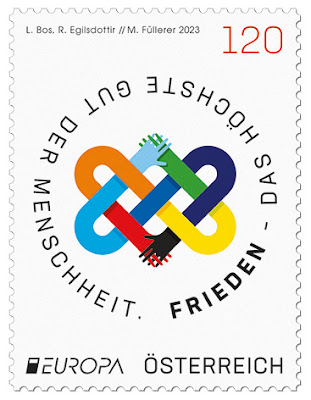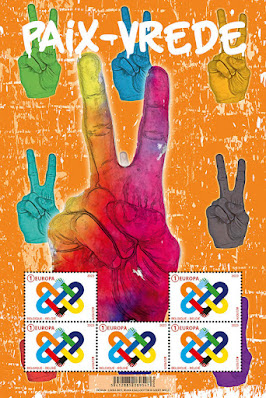 France
France
Date of Issue: 9th May 2023
one stamp (1.80 €)
Wednesday, March 8
Sunday, March 5
Thursday, February 16
Thursday, December 15
Wednesday, December 7
Bulgaria 2022
 Bulgaria
Bulgaria
Date of Issue: 7th December 2022
two stamps (1.25 & 2.70 BGN) and one souvenir sheet (1.25 & 2.70 BGN)
both stamps are issued in mini sheet of 8 stamps
both stamps are issued in a booklet of 2 panes (2x 4 unperforated stamps)
a postal stationery is also issued (0.75 BGN)
Khan Asparuh, the first Bulgarian king, had a sister called Huba. She was held captive in another kingdom. Asparuh sent a message to his sister that he had found a land where they could settle down south of the Danube River, a place that nowadays is Bulgaria.
When Huba got the good news from her brother, she managed to escape from captivity and run away. She rode on horseback without stopping until she reached the Danube River. She looked for some way to cross the mighty river but couldn’t find a ford to pass across. So then she tied a thread of white yarn to one of the legs of a falcon sent by her brother and let him fly up into the air, holding the other end of the thin thread in her hands.
The falcon flew away to find a ford for passage across the river and just then, when he found a place, an arrow shot by an enemy pierced the falcon, and he fell to the ground dead. The yarn became red from his blood. Huba followed the thread she was holding and so she found the way to cross the great river and reach the country where her brother Asparuh had made his new home. Then they lived free and happy in the new land they called Bulgaria.
That day was March 1st, the new year in the tradition of those times. They called the white and red threads of yarn after the name of the month March, and named it ‘Martenitsa.’
The Martenitsa became a symbol of peace and love, health and happiness. The white color symbolizes purity and honesty in relationships, and the red color means life, passion, and cordiality in friendship and mutual love. Source : Europe's not dead
Sunday, December 4
Belgium 2023
 Belgium
Belgium
Date of Issue: 12th June 2023
one stamp (Europe 1st class value)
This stamp is issued in a mini-sheet of 5 stamps
Friday, November 18
Ukraine 2022
 Ukraine
UkraineDate of Issue: 22nd November 2022
two stamps (2x A value = 1.- USD)
both stamps are issued in a mini sheet of 6 stamps
Svarog – God is the creator of the Universe - Svarog is a Slavic god of fire and blacksmithing, who was once interpreted as a sky god on the basis of an etymology rejected by modern scholarship. He is mentioned in only one source, the Primary Chronicle, which is problematic in interpretation. He is presented there as the Slavic equivalent of the Greek god Hephaestus. The meaning of his name is associated with fire. Source Wikipedia
Lada – Goddess of motherhood - Lada was first mentioned around 1405-1412 in the sermons of Lucas of Wielki Koźmin, which warned against worshipping Lada and other gods during spring ceremonies and folk performances. They owe their popularity to Długosz, who in one of his sources recognized Lada as a goddess and in another as a god of war, the Polish equivalent of the Roman god Mars, to Aleksandr Faminstyn, who recognized the word Lada in Russian songs as the goddess of marriage, and to scholar Boris Rybakov, who insisted on recognizing her historicity. However, the vast majority of religious scholars and Slavists reject the historicity of these deities, believing that they owe their divine status to a misunderstanding of the song refrains by medieval scribes. Source Wikipedia



















